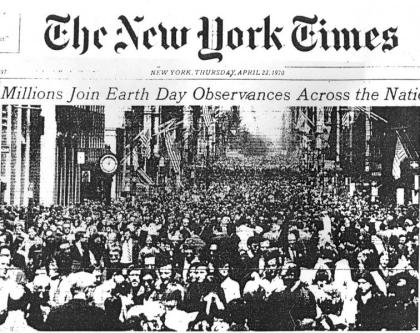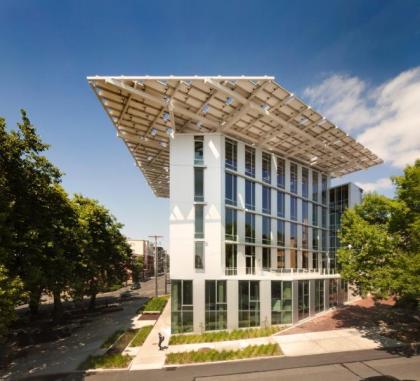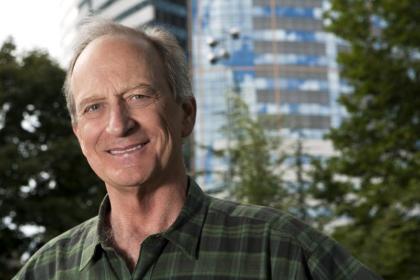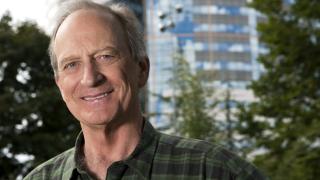Interview with EGA member, Denis Hayes, CEO of the Bullitt Foundation and Coordinator of the first Earth Day
4/29 Update: Images from the Earth Day action in Ottawa, Canada have been added in the first interview question.
Denis Hayes is an internationally renowned environmental advocate and coordinator of the first Earth Day on April 22, 1970. Earth Day started as a grassroots effort to raise awareness about the environment and has become the longest-running day of action for people and planet around the world. Denis has played a role in organizing various parts of the environmental movement and sector, including serving on EGA’s Governing Board. Currently, Denis is the CEO of the Seattle-based Bullitt Foundation. The Foundation is preparing to sunset this year to make way for the next generation of environmental philanthropists.
We spoke with Denis about recognizing Earth Day 2024 amidst overlapping crises and shifting politics, and insights from his time leading the Bullitt Foundation to ‘walk the talk’ of the environmental movement.
Fifty-four years ago, you organized the first Earth Day in 1970, and in 1990 you began spreading the campaign to other nations. What major actions are planned for 2024?
As always, there will be thousands of actions around many different issues. One of the most visible will be in Ottawa, Canada, where negotiators will meet on Earth Day to advance a UN treaty on plastic pollution. Amid demonstrations, earthday.org plans to project powerful images on downtown buildings and erect scores of billboards. Our goal is to pressure nations to broaden the UN treaty to address the health consequences and biodiversity threats of plastics.
Next year—the fifty-fifth anniversary—will doubtless be bigger and will have a more sweeping theme. Anniversaries that end in fives and zeros get more attention!

First Earth Day covered in The New York Times. Headline reads “Millions Join Earth Day Observances Across the Nation.”

Images from the Earth Day action projecting images of "Plastic is Toxic" and "Make Plastic Pollution History" in Times Square (first top left photo) and Ottawa, Canada.
What do you imagine would be the most impactful way for individuals to honor Earth Day 2024 in this challenging moment for climate, communities, and democracy?
Earth Day is being observed this year in more than 180 nations with very different cultures, economies, and politics. There is no ‘one size fits all’ campaign. What works for Extinction Rebellion won’t be suitable for Mrs. Knutson’s kindergarten class. The most impactful and most memorable events tend to be those that organize large numbers of people to build public support to solve some problem, whether it’s local or global—or, like climate change, both.
Are there specific issues or challenges that you want Grantmakers to focus on to honor the collective value and stewardship responsibility for the planet, in this challenging moment for politics, people and planet?
Earth Day will be what you and your grantees make of it. On Earth Day, newspapers are receptive to provocative op-eds; schools are open to speakers and programming; and the public is eager to participate. Most social movements would benefit from a day when the whole planet focuses on their issue. Strangely, most of our national environmental groups do not take much advantage of this day.
One specific suggestion: Lots of EGA members sponsor local NPR stations. If your grantees decide to build a strategic Earth Day campaign next year, consider running NPR blurbs for two to three weeks beforehand letting that key audience know when, where, and why.
You've served as Bullitt Foundation's CEO since 1992. Under your leadership, the Foundation has distributed over $200 million in grants to support ecosystems, climate-resilient cities, innovative green buildings such as the Bullitt Center, racial equity, and emerging leaders. How did you marshal resources to build a leader’s vision that “walked the talk” of the environmental movement and philanthropy?
As someone who has spent many years on the other side of the desk, I did my best to create a knowledgeable, strategic, and humble culture at the Foundation. Our most impactful grants were based on ideas that originated from grantees, not us.
As for ‘walking the talk,’ the answer is awfully simple: Just do it. At Bullitt, we removed any investment from our portfolio that was not aligned with our values. We recruited a very talented, very diverse board and staff. We couldn’t find a building in Seattle that was genuinely deep green, so we designed and built one on the bleeding edge. Then we operated it for ten years in the black with true net positive energy, net zero water, zero toxics, and no parking garage for cars—just bicycles. Foundations, which aren’t compelled to grow and be profitable, should feel a responsibility to take risks and explore the frontiers.

The Bullitt Center in Seattle
The Bullitt Foundation will sunset this year. Congratulations! Why was it important for the Foundation to spend down, now? What insights have you gleaned from the process?
A lot of foundations become bureaucracies, focused largely on keeping themselves going in perpetuity and avoiding controversy. Bullitt decided to avoid that fate by spending down its endowment in a strategic, measured way.
Moreover, it doesn’t make sense to risk losing important, irreversible battles today in order to keep powder dry for issues that might arise tomorrow. The next couple decades will see the greatest intergenerational wealth shift in history, and much of it will go into new foundations that will tackle new issues.
Denis, you are leaving a significant and sustained legacy that has already been shaping the work of environmental and philanthropy leaders for generations to come. In your view, how can an enduring leader impact the next wave of changemakers and risk-takers in environmental grantmaking?
I am, of course, flattered by your characterization. But I don’t think the next generation is eagerly awaiting the insights of an eighty-year-old geezer. When I was twenty-five, I wasn’t interested in “the wrong ideas of dead white men.”
At twenty-five, I knew with absolute certainty that my generation would pass on to its children a world that was far more healthy, resilient, just, peaceful, and sustainable than the one we were inheriting. I was wrong on all counts. World and domestic politics have suddenly made global war more thinkable. The litany of problems I’m handing off to my daughter and granddaughter fills me with frustration.
Of the big issues facing us—war, racism, overpopulation, the epidemic of extinction—climate change is the easiest to solve! We’ve known what we need to do since at least the Jimmy Carter Administration. Today’s young people have every right to their outrage.
If I, nevertheless, were to offer one piece of advice, it is to be bold. That is different from being reckless or stupid. We have run out of time for timidity.
If you would be willing to share, tell us, what's next for you?
In direct contradiction to my previous answer, I’m going to try to write a couple of books that I’ve been thinking about for the last fifty years.

Denis Hayes is the CEO of the Bullitt Foundation, which is sunsetting this year. He was the national coordinator of the first Earth Day on April 22, 1970. Denis has previously served on EGA’s Governing Board and contributed to numerous Fall Retreats and EGA events. We thank Denis for his time and contributions to the EGA community!



